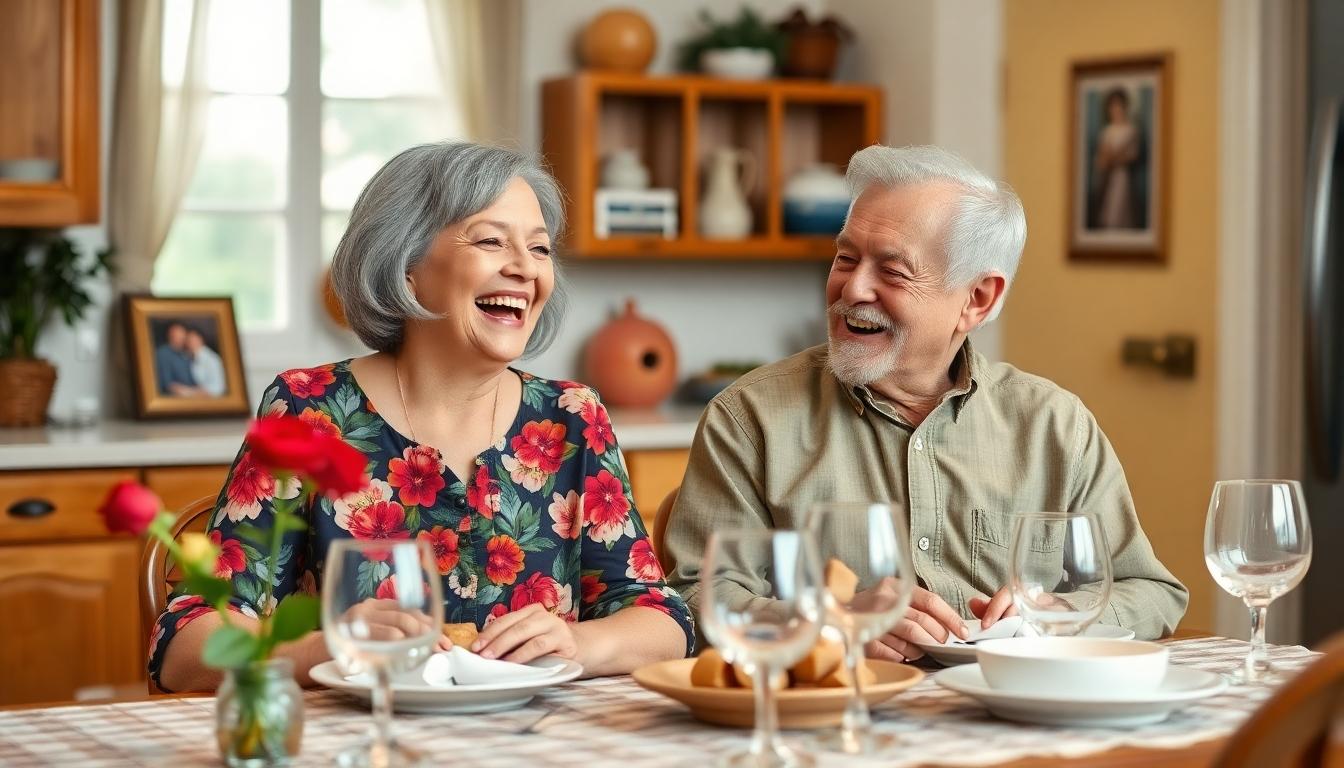Laughter doesn’t have an age limit, and our collection of senior jokes proves just that! We’ve gathered the funniest, most relatable humor that celebrates the golden years with wit and charm. These jokes aren’t just hilarious—they’re a perfect way to brighten anyone’s day, especially those embracing the wisdom that comes with age.
We all know that aging comes with its unique challenges and joys. From retirement shenanigans to memory slip-ups and doctor’s visits, our handpicked senior jokes touch on the experiences that make growing older such an adventure. Whether you’re looking to share a laugh with grandparents, liven up a retirement party, or simply enjoy some age-appropriate humor, you’ll find exactly what you need in our compilation.
10 Hilarious Senior Jokes That Will Have Everyone Laughing
- The Memory Test
An 80-year-old couple was having problems remembering things, so they decided to go to their doctor for a checkup. The doctor told them nothing was wrong except they might want to start writing things down. Later that evening, while watching TV, the husband got up. “Want anything while I’m in the kitchen?” he asked. “Some ice cream would be nice,” replied the wife. “Better write it down,” she suggested. “I can remember ice cream,” he said. “I’d like strawberries on top,” she added. “Write it down.” “I can remember that,” he insisted. “And whipped cream too,” she added. “For goodness sake, write it down!” she implored. Irritated, he went to the kitchen, returning 15 minutes later with… bacon and eggs. “See,” said the wife, “you should’ve written it down. You forgot my toast!”
- Technology Troubles
My 85-year-old grandfather started taking computer classes. When I asked how it was going, he said, “Well, I’ve mastered the power button. The instructor says I’m only 99 keyboard shortcuts away from being an expert!”
- Doctor’s Visit
An elderly man visits his doctor for his annual checkup. “You’re in great shape for 72,” says the doctor. “Thanks, but I’m actually 97,” replies the man. The doctor, shocked, asks, “How did you stay so healthy?” The man explains, “By never arguing with people.” The doctor says, “That’s impossible, you can’t be 97!” The old man nods and says, “You’re right, I’m 72.”
- Retirement Plans
Two retirees were discussing their plans. “I just joined a health club,” said the first. “Spent $300.” The second replied, “You should’ve checked with me first. I joined last year and spent $10.” “Really? How’d you find such a cheap health club?” asked the first. “I didn’t,” said his friend. “I just stay home and watch exercise programs on TV. I figured out that every time they say ‘stretch,’ I can grab a cold beer from the fridge!”
- Marriage Advice
At their 50th wedding anniversary celebration, a guest asked the couple their secret to a long-lasting marriage. The husband replied, “When we got married, we agreed on one thing—I’d make all the big decisions, and my wife would make all the small ones.” The guest asked, “How’s that working?” The husband shrugged, “Great! Fifty years, and we haven’t had to make a single big decision yet!”
- Hearing Problems
Three retirees were discussing their health issues. The first said, “My arms are so weak I can barely hold a cup of coffee.” The second complained, “My cataracts are so bad I can’t even recognize my wife.” The third said, “That’s nothing. I can’t turn my head because of arthritis.” They all agreed they were getting old. Then the third continued, “Well, at least my hearing’s perfect!” His friend asked, “Really?” “Yep,” he replied. “7:30, I think someone’s knocking at the door!”
- The Golf Game
Four senior friends were playing their weekly round of golf. “These hills are getting steeper,” said one. “These greens are getting harder to see,” said another. “These clubs are getting heavier,” commented the third. The fourth remained quiet until they finished the hole. As they walked to the next tee, he finally spoke up: “At least we’re still on the right side of the grass!”
- Wise Investment
An elderly couple was celebrating their 60th anniversary when a fairy appeared. “For being such a devoted couple, I’ll grant each of you one wish,” she said. The wife immediately wished for a luxurious cruise around the industry. With a wave of the fairy’s wand, tickets appeared in her hand. The husband thought for a moment and said, “I wish I had a wife 30 years younger than me.” The fairy waved her wand, and suddenly the husband was 95 years old!
- The Reunion
At their 50-year high school reunion, two elderly ladies were catching up. “You know,” said the first woman, “I married the boy who always pulled my pigtails in third grade.” Her friend asked, “Really? How did that work out?” She replied, “Not great. He’s still pulling my leg!”
- The Birthday Present
The Art of Aging Gracefully With Humor

Why Laughter Is Essential in the Golden Years
Laughter becomes more valuable than ever during our senior years, serving as both medicine and resistance against the challenges of aging. Research confirms that humor provides important health benefits for older adults, contributing directly to mental and emotional well-being. Seniors who maintain a sense of humor often develop stronger coping mechanisms that help them navigate the physical changes and societal perceptions associated with aging. Many healthcare professionals recognize laughter as an essential component of healthy aging, recommending daily doses of humor to reduce stress hormones and boost immune function. The ability to laugh at life’s circumstances creates resilience, allowing seniors to approach aging with a positive mindset rather than dread or resignation.
How Senior Jokes Break Age Stereotypes
Senior jokes play a powerful role in challenging and reshaping common ageist stereotypes that pervade our society. Studies have revealed that older adults strategically use humor in online communities to present their age group more positively when jokes target fellow seniors. This self-directed humor serves as a tool for reclaiming narrative control over aging experiences. Research shows that seniors often incorporate contemporary cultural views of sexuality and aging into their jokes, effectively normalizing senior sexuality through humor. Common stereotypical characters in jokes about older adults include the forgetful senior, the impotent male, and the infirm elderly person—yet seniors frequently subvert these tropes by acknowledging and then disrupting the expected punchline. Through this creative resistance, senior jokes transform from potential vectors of ageism into powerful mechanisms for breaking down harmful stereotypes and fostering more positive attitudes toward aging.
Memory-Related Senior Jokes That Hit Home

Studies show humor can enhance memory recall in older adults when paired with relevant content. We’ve compiled some of the funniest memory-related jokes that seniors will find especially relatable.
When Forgetfulness Becomes Funny
Memory lapses provide some of the most relatable humor for seniors. “I don’t forget—I just have random access memories” perfectly captures the selective nature of aging memories. Research suggests laughter may actually reduce cortisol levels, potentially improving short-term memory function. Seniors often use self-deprecating humor about forgetfulness as a coping mechanism, turning potential frustration into laughter.
“I told my grandkids I have ‘selective hearing’… now I can’t remember what I selected” is a classic example that resonates with many older adults. Another favorite among seniors is “I’ve got a photographic memory—it just takes me a week to develop the pictures.” While studies note older adults may sometimes struggle with complex joke structures, humor about relatable experiences remains extremely popular in senior communities.
Technology and Memory Mix-ups
Technology provides endless material for senior memory jokes, often highlighting the generational gap in tech adoption. “My phone’s face recognition works better than mine after 70” cleverly combines facial recognition challenges with memory issues. Many seniors find tech-based humor particularly amusing because it normalizes their struggles.
“I tried using cloud storage, but I keep forgetting my password to the sky” demonstrates how technology terminology creates perfect setups for memory-related punchlines. Research indicates pairing factual information with relevant humor significantly improves recall, suggesting these jokes might actually help seniors remember through cognitive association. The combination of technology confusion and memory lapses creates uniquely relatable humor that resonates with older adults handling our increasingly digital industry.
Doctor’s Office and Healthcare Humor

Healthcare settings often become breeding grounds for humor, as medical professionals use comedy to navigate high-stress environments. Patients with conditions like dementia or Alzheimer’s sometimes inadvertently create moments of levity, such as the patient who, after being told they had both cancer and Alzheimer’s, cheerfully remarked, “At least I don’t have cancer.”
Prescription Comedy
Medical professionals have developed a unique brand of humor that appears in patient charts and clinical notes. Chart entries like “Alive, but without my permission” under patient discharge status showcase the darkly comedic side of healthcare documentation. Symptom descriptions sometimes venture into the absurd with notes such as “Skin: somewhat pale, but present” or the particularly memorable “Patient has two teenage children, but no other abnormalities.” Dietary documentation can be equally amusing, with entries like “Patient had waffles for breakfast and anorexia for lunch.” These witty observations highlight how healthcare workers blend pragmatism with absurdity to cope with daily challenges in clinical settings.
Medical Examination Laughs
Examination notes frequently contain unintentional comedy that seniors find particularly relatable. Neurological assessments sometimes feature bizarre phrasing like “She is numb from her toes down,” leaving readers wondering about the alternative. Genital examination notes occasionally venture into uncomfortable territory with descriptions such as “Examination revealed he is circus-sized.” Patient history can provide unexpected insights into life circumstances, as with the note “Constipated for most of her life until she got a divorce.” Research indicates these moments of levity serve an important purpose beyond entertainment, as laughter in seniors reduces stress, improves cognitive function, and may lower risks of functional disabilities. Healthcare facilities increasingly incorporate structured humor activities into geriatric care programs specifically to enhance overall well-being among senior patients.
Retirement and Leisure Time Chuckles

Retirement brings a whole new chapter of life filled with freedom, family time, and plenty of opportunities for humor. Seniors have perfected the art of poking fun at this transition from work to leisure with witty one-liners and relatable jokes.
When you retire, there’s a delightful shift in priorities that becomes fodder for comedy: “You’re retired – goodbye tension, hello pension!” This sentiment captures the liberation many seniors feel upon ending their formal careers. Many retirees joke about the sudden abundance of free time with quips like “Retirement: No job, no stress, no pay!” which highlights both the benefits and challenges of this life stage.
Family dynamics often take center stage in retirement humor. As one popular joke notes, “A retired husband is often a wife’s full-time job,” reflecting the adjustment period many couples experience when suddenly spending all day together. Daily routines become a source of amusement too, especially when seniors poke fun at their own pace: “How many retirees does it take to change a light bulb? Only one, but it might take all day!”
Golf Course Giggles
Golf courses serve as prime territory for senior humor, where pace of play and physical limitations become running jokes. Seniors often mock their own deliberate approach to the game with self-deprecating humor about their swing speed or stamina.
Many retired golfers joke about using their backswing as part of their daily exercise routine: “I don’t need a golf cart – my backswing doubles as a stretching program.” The friendly competition among senior golfers creates natural opportunities for ribbing, especially about declining abilities or exaggerated tales of past athletic prowess.
Equipment becomes a punchline too, with seniors quipping about needing special gear just to make it through 18 holes. The social aspect of golf provides rich material for jokes about hearing loss, forgotten scores, and the inevitable 19th hole celebrations where the day’s round improves dramatically with each retelling.
Vacation and Travel Jokes
Travel takes on new meaning in retirement, becoming both more accessible and complicated in ways that inspire clever humor. Seniors particularly enjoy joking about packing challenges: “I bring reading glasses on trips – to see where I left my passport.”
Air travel provides especially fertile ground for senior jokes: “Why do retirees smile on planes? They’ve already packed their hearing aids!” This highlights the common experience of forgetting essential items while traveling. The relaxed pace of retirement travel becomes a source of humor too, with many seniors joking that “Retirees don’t need maps; getting lost is the adventure.”
Cruise ships, a popular choice for senior travelers, inspire jokes about buffet lines, scheduled activities, and the joys of unpacking just once. Many seniors humorously compare vacation planning before and after retirement, noting how Monday through Friday are now just “weekend adjacent” rather than obstacles to overcome when scheduling time away.
Research shows these retirement and leisure jokes serve an important purpose beyond mere entertainment—they help seniors navigate important life transitions through shared laughter while promoting both mental and physical health benefits.
Technology Troubles That Seniors Face

Recent studies reveal that 64% of adults over 50 believe technology isn’t designed with their needs in mind. While this percentage has slightly improved from 68% in 2022, seniors continue to face important challenges handling our increasingly digital industry.
Smartphone Struggles
Smartphones present particular difficulties for many older adults, with only 61% of seniors owning these devices compared to 96% of adults aged 18-29. Many elderly users find touchscreens frustratingly unresponsive due to decreased finger sensitivity and dexterity issues that come with aging. Text that appears perfectly readable to younger eyes often proves too small for seniors to decipher comfortably. Navigation through multiple apps becomes overwhelming when interfaces change frequently, as 77% of seniors require assistance when learning new devices. We’ve heard countless stories of grandparents accidentally enabling strange settings or becoming frustrated when attempting simple tasks like taking photos or making video calls.
Marriage and Relationship Jokes for the Long-Haul Couples

When you’ve been married for decades, humor becomes not just entertainment but a survival tool. Research shows that couples who laugh together stay together, especially among those who’ve weathered life’s storms side by side for 35+ years.
The Secret to 50+ Years Together
Couples celebrating golden anniversaries often credit humor as their relationship superglue. Studies reveal that as relationships mature, conflicts typically give way to more humor and less defensiveness – a key shift in maintaining long-term relationship health. Days filled with laughter consistently lead to higher relationship satisfaction, which in turn creates more humorous interactions the following day. This positive cycle helps couples navigate challenges that come with aging together.
“I asked my wife where she wanted to go for our 50th anniversary. She said, ‘Somewhere we haven’t been in a long time.’ So I suggested the kitchen!”
“The secret to our 60-year marriage? I take my wife everywhere, but she keeps finding her way back!”
“After 50 years of marriage, we finish each other’s… arguments.”
Two types of humor prove particularly beneficial for long-haulers: affiliative humor, which amuses others to maintain positive relations, and self-improving humor, which finds the funny side in adverse situations or pokes fun at oneself rather than one’s partner.
In-Law Humor That Never Gets Old
In-law jokes remain timeless comedic material for seniors who’ve spent decades handling extended family dynamics. Classic mother-in-law punchlines continue to draw laughs at anniversary parties and family gatherings across generations. While positive humor strengthens bonds between couples, researchers note that negative humor like put-downs may have adverse effects on relationship satisfaction.
“My mother-in-law has been living with us for 20 years. The judge said if she behaves herself, that sentence could be reduced to 10.”
“I told my wife I finally figured out why they call it ‘mother-in-law’ – because ‘monster-in-law’ was already taken!”
“When we celebrated our 40th anniversary, my mother-in-law gave us a clock that counts down to her next visit. That’s when I knew she finally accepted me.”
Shared laughter about in-laws creates a unique bond between spouses, building on decades of shared experiences and inside jokes that outsiders might not understand. This special form of intimate communication helps couples maintain their connection through life’s challenges and changes.
Senior Dating Scene Comedy

The senior dating scene is filled with delightful comedic moments that stem from generational differences and changing relationship norms. From romantic mishaps to technology struggles, senior daters provide a unique perspective on finding love later in life.
Second-Time-Around Romance
Second-time-around romances offer a goldmine of humorous situations as seniors navigate dating with decades of life experience behind them. Research shows these narratives often feature older adults overcoming midlife anxieties through new romantic connections while trying to maintain “successful aging” ideals like active lifestyles and sexual vitality. Romantic comedies frequently capitalize on the amusing contrast between characters’ substantial relationship baggage and their renewed optimism about finding love. Dating after loss or divorce creates particularly funny scenarios when seniors must:
- Adapt to modern dating rules that differ dramatically from the courtship rituals of their youth
- Balance new relationship expectations with established lifestyles and routines
- Navigate family dynamics when adult children have opinions about their parent’s dating life
- Redefine romantic goals as companionship often takes priority over traditional relationship milestones
These comedic narratives typically frame love as the perfect remedy for loneliness or stagnation, though they sometimes reinforce traditional gender stereotypes, such as men pursuing significantly younger partners or women prioritizing companionship over independence.
Senior Dating App Disasters
Senior dating app mishaps create some of the most hilarious anecdotes in modern romance. Online dating platforms present unique challenges for older adults who didn’t grow up with this technology. Common dating app disasters for seniors include:
- Profile photo controversies – Using decades-old images that barely resemble current appearances
- Accidental swipes and likes – Mistakenly approving potential matches while still learning app navigation
- Technology confusion – Struggling with video call setups or sending unintended messages
- Misinterpreted dating lingo – Misunderstanding modern terms like “ghosting” or emoji meanings
Reality TV shows like Netflix’s The Later Daters capitalize on these situations, showcasing seniors experiencing tech fails during video dates or miscommunicating through generational slang differences. Studies indicate dating platforms often perpetuate problematic stereotypes, with older women feeling pressure to appear youthful while men are portrayed as financially stable but emotionally distant.
Even though these technological hurdles, seniors increasingly adopt dating apps with determination. Their persistence amid steep digital learning curves creates naturally humorous situations that highlight their courage in seeking connection regardless of age or technological barriers.
Grandparenting Jokes That Bridge Generations

Research shows that while older adults may experience some decline in humor comprehension due to cognitive changes, they still value and use humor as a vital connection point with younger generations. These grandparenting jokes celebrate the special relationship between seniors and their grandchildren, highlighting the amusing moments that occur when different generations interact.
When Grandkids Teach Technology
Technology often becomes the perfect comedic setting for grandparent-grandchild interactions. Studies reveal that seniors frequently encounter challenges with digital devices, creating countless opportunities for lighthearted humor. Many grandparents have been known to mail photocopies of their phone screens to family members or struggle with basic digital terminology in ways that become family legends.
“My grandson tried teaching me how to use Instagram. Now I just take Polaroids and tape them to the refrigerator with hashtags written underneath.”
“After showing Grandpa how to use voice commands, he now speaks to every electronic device in the house, including the toaster.”
“My granddaughter set up my smartphone. Two weeks later, I discovered I’d been texting my gardening advice to the pizza delivery place instead of my garden club.”
“Grandma kept complaining her tablet wasn’t working. Turns out she was trying to charge it with a phone charger from 1985.”
Spoiling Grandchildren Shamelessly
Grandparents often joke about their role as the ultimate rule-benders when it comes to their grandchildren. The ever-changing of being deliberately more lenient than parents creates a rich source of intergenerational humor. Grandparents frequently boast about overindulging their grandchildren with treats, gifts, and permissions that parents would never allow.
“My daughter says, ‘Don’t give them sugar before bedtime.’ I say, ‘What happens at Grandma’s stays at Grandma’s.'”
“I follow a strict grandparenting philosophy: if it makes noise, requires batteries, or will drive the parents crazy, it’s the perfect gift.”
“My son asked why his kids always come home from our house with new toys. I told him, ‘It’s not spoiling—it’s advanced inheritance distribution.'”
How to Share Senior Humor Appropriately

Keeping It Respectful and Inclusive
When sharing humor with seniors, we must maintain a respectful approach that honors their experiences. Research indicates that elderly individuals are particularly sensitive to jokes about aging, so it’s best to avoid humor that targets or mocks the aging process. Instead, we should focus on non-aggressive humor styles that seniors typically prefer.
Affiliative humor works exceptionally well with older adults, as it creates positive social connections rather than dividing people. This style of humor affirms both the individual and others around them, fostering a sense of community. Self-improving and authentic humor styles are also well-received by seniors, helping them cope with age-related challenges in a positive way.
Always consider the context and your audience when sharing jokes. Humor that celebrates the wisdom and unique perspectives of older adults tends to be more appreciated than jokes that poke fun at physical limitations or cognitive changes. Remember that seniors enjoy humor as much as—if not more than—younger individuals, even if they occasionally have difficulty understanding certain types of jokes.
Using Humor to Connect Across Generations
Humor serves as a powerful bridge between different age groups when used thoughtfully. We find that focusing on common life experiences creates the most effective intergenerational humor. Stories about family dynamics, everyday mishaps, or universal human experiences tend to resonate across age barriers.
Inclusive themes help foster a sense of unity and shared laughter between seniors and younger generations. Topics that everyone can relate to—regardless of age—create meaningful connections through humor. For instance, jokes about technology can be framed in ways that acknowledge the learning curve without diminishing anyone’s intelligence or abilities.
Research shows that humor training programs can actually improve seniors’ sense of humor in later life, suggesting that sharing appropriate jokes regularly benefits older adults. These humorous exchanges can increase heart rate by 10% to 20% during genuine laughter, providing physiological benefits alongside the social connection.
When captivating with seniors through humor, using inclusive language that doesn’t alienate or other them reinforces respect while maintaining the fun. Actively listening to the types of jokes seniors themselves share offers valuable insights into their humor preferences and helps guide future interactions. Through thoughtful humor sharing, we create meaningful bonds that transcend generational differences while honoring the unique perspectives that come with age.
The Therapeutic Benefits of Laughing About Aging
Laughter truly is the best medicine at any age. We’ve shared these hilarious senior jokes not just for entertainment but as a celebration of life’s golden years.
The power of humor extends beyond the punchlines as it builds connections across generations while helping seniors navigate life’s changes with grace and wit. From technology troubles to retirement adventures these jokes reflect authentic experiences.
Remember that sharing a laugh about aging isn’t just fun – it’s therapeutic. Research shows that seniors who maintain their sense of humor enjoy better mental health physical wellbeing and stronger relationships.
So keep these jokes handy whether you’re planning a retirement party or simply wanting to brighten someone’s day. After all aging isn’t just about growing older – it’s about growing funnier!
Frequently Asked Questions
Why is humor important for seniors?
Humor plays a vital role in seniors’ lives by reducing stress, improving cognitive function, and enhancing overall well-being. Research shows that seniors who maintain a sense of humor develop stronger coping mechanisms and approach aging more positively. Laughter can lower cortisol levels, potentially improving short-term memory, and may reduce the risk of functional disabilities. Beyond physical benefits, humor helps seniors navigate life transitions and combat ageist stereotypes.
What types of jokes do seniors find most relatable?
Seniors particularly enjoy jokes about memory lapses, retirement, technology struggles, healthcare visits, and long-term relationships. Relatable jokes like “I don’t forget—I just have random access memories” or “You’re retired – goodbye tension, hello pension!” resonate because they transform common aging experiences into shared moments of laughter. Jokes about grandparenting and the generational gap in technology use are also popular among older adults.
How does humor help seniors cope with memory challenges?
Humor serves as both a coping mechanism and potential memory aid for seniors. Jokes about forgetfulness create a sense of community around a shared experience. Research suggests that laughter may reduce stress hormones that impact memory function. Additionally, humorous content may be more memorable, helping with recall through cognitive association. By laughing about memory lapses, seniors normalize these experiences and reduce anxiety around them.
Can humor improve seniors’ relationships?
Absolutely. Research shows that couples who laugh together tend to have healthier long-term relationships, especially those married for over 35 years. Shared humor creates bonds between spouses, helps navigate family dynamics, and serves as a survival tool in enduring relationships. For grandparents, humor bridges generational gaps with grandchildren. Positive, non-aggressive humor styles foster meaningful connections both within families and in senior communities.
How do seniors use humor to deal with technology challenges?
Seniors often transform their technology struggles into comedic material. With 64% of adults over 50 feeling technology isn’t designed for them, humor provides relief from frustration. Jokes about accidentally enabling strange settings, confusion with touchscreens, or misunderstanding digital terminology allow seniors to laugh at these challenges rather than being defeated by them. This humor also helps bridge generational gaps when shared with younger family members.
What role does humor play in healthcare settings for seniors?
Humor serves multiple purposes in senior healthcare settings. Medical professionals use comedy to navigate high-stress environments and build rapport with patients. For seniors, laughter during medical appointments reduces anxiety and may improve communication with providers. Even patients with conditions like dementia often create moments of unexpected levity. Healthcare facilities increasingly incorporate structured humor activities into geriatric care programs to enhance overall patient well-being.
How can family members share humor appropriately with seniors?
Share humor that respects seniors’ experiences rather than mocking their challenges. Focus on non-aggressive humor styles like affiliative humor (jokes that build connections) and self-improving humor. Choose jokes that seniors can relate to rather than those that reinforce negative stereotypes. The best approach is finding common ground through shared life experiences and inclusive themes that create meaningful bonds across generations.
Why are retirement jokes popular among seniors?
Retirement jokes help seniors navigate a significant life transition with laughter. Jokes about newfound freedom (“I’m retired—my job is now to forget what day it is”), changing family dynamics, and daily routines provide relatable humor for this life stage. These jokes normalize the challenges and joys of retirement while creating community among retirees. Research indicates that this humor serves beyond entertainment—it helps seniors process their new identity and schedule.
How do seniors use humor to challenge ageist stereotypes?
Seniors actively use humor to reclaim narrative control over their aging experiences. By making jokes about their age on their own terms, older adults present their demographic more positively and challenge prevailing stereotypes. This form of creative resistance transforms potentially ageist humor into empowerment. When seniors initiate the joke, they shift from being the subject of humor to active participants, fostering more positive attitudes toward aging.
Can humor training benefit seniors?
Yes, research shows that humor training can enhance seniors’ sense of humor and provide both social and physiological benefits. Structured humor activities in senior centers and healthcare facilities help develop this skill. Learning to use and appreciate humor improves seniors’ quality of life by reducing stress, enhancing social connections, and promoting a positive outlook. The ability to find humor in everyday challenges becomes an important coping mechanism for healthy aging.







